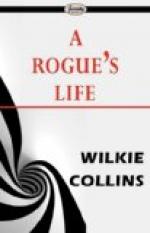Sleep was not much in my way that night. I rose almost as early as Boots himself—breakfasted—then sat at the coffee-room window looking out anxiously for the two coaches.
Nobody seemed to agree which would pass first. Each of the inn servants of whom I inquired made it a matter of partisanship, and backed his favorite coach with the most consummate assurance. At last, I heard the guard’s horn and the clatter of the horses’ hoofs. Up drove a coach—I looked out cautiously—it was the Humming Bee. Three outside places were vacant; one behind the coachman; two on the dickey. The first was taken immediately by a farmer, the second—–to my unspeakable disgust and terror—was secured by the inevitable Bow Street runner; who, as soon as h e was up, helped the weakly Screw into the third place, by his side. They were going to Crickgelly; not a doubt of it, now.
I grew mad with impatience for the arrival of the Red Cross Knight. Half-an-hour passed—forty minutes—and then I heard another horn and another clatter—and the Red Cross Knight rattled up to the hotel door at full speed. What if there should be no vacant place for me! I ran to the door with a sinking heart. Outside, the coach was declared to be full.
“There is one inside place,” said the waiter, “if you don’t mind paying the—”
Before he could say the rest, I was occupying that one inside place. I remember nothing of the journey from the time we left the hotel door, except that it was fearfully long. At some hour of the day with which I was not acquainted (for my watch had stopped for want of winding up), I was set down in a clean little street of a prim little town (the name of which I never thought of asking), and was told that the coach never went any further.
No post-chaise was to be had. With incredible difficulty I got first a gig, then a man to drive it; and, last, a pony to draw it. We hobbled away crazily from the inn door. I thought of Screw and the Bow Street runner approaching Crickgelly, from their point of the compass, perhaps at the full speed of a good post-chaise—I thought of that, and would have given all the money in my pocket for two hours’ use of a fast road-hack.
Judging by the time we occupied in making the journey, and a little also by my own impatience, I should say that Crickgelly must have been at least twenty miles distant from the town where I took the gig. The sun was setting, when we first heard, through the evening stillness, the sound of the surf on the seashore. The twilight was falling as we entered the little fishing village, and let our unfortunate pony stop, for the last time, at a small inn door.
The first question I asked of the landlord was, whether two gentlemen (friends of mine, of course, whom I expected to meet) had driven into Crickgelly, a little while before me. The reply was in the negative; and the sense of relief it produced seemed to rest me at once, body and mind, after my long and anxious journey. Either I had beaten the spies on the road, or they were not bound to Crickgelly. Any way, I had first possession of the field of action. I paid the man who had driven me, and asked my way to Zion Place. My directions were simple—I had only to go through the village, and I should find Zion Place at the other end of it.




